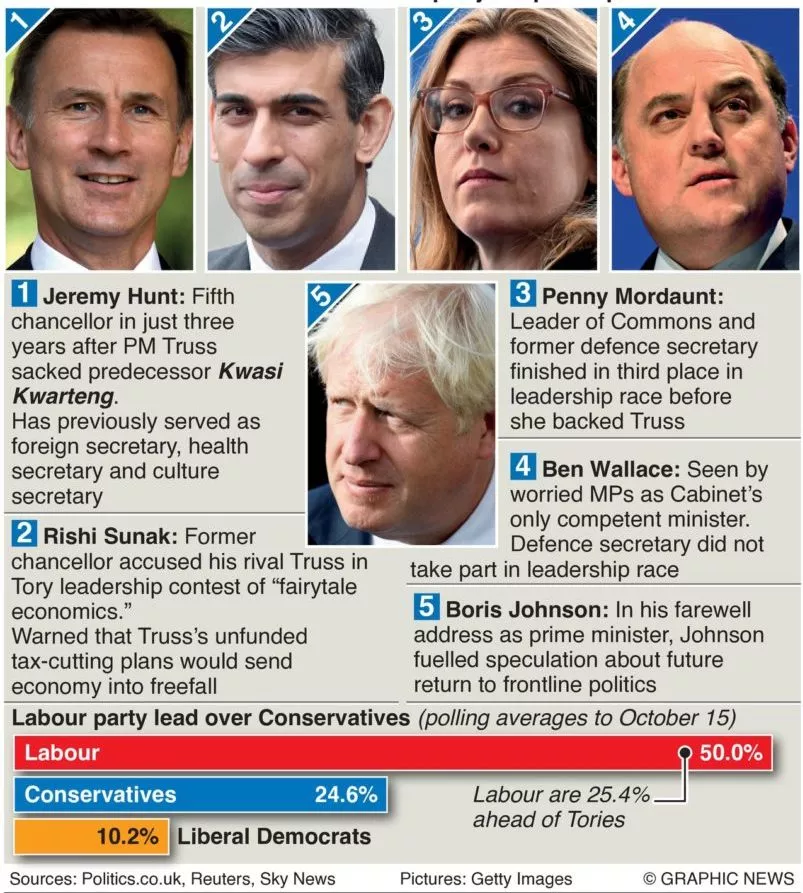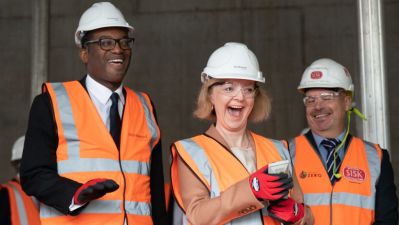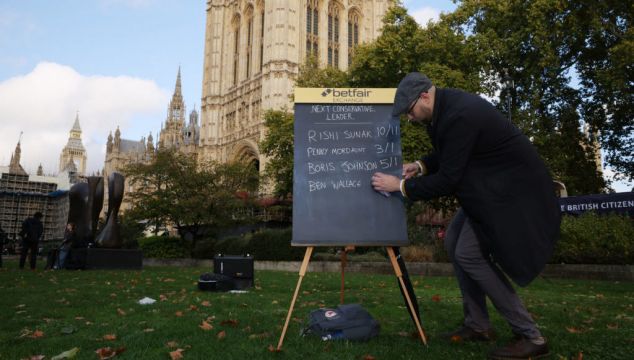- Liz Truss has announced her resignation as leader of the UK's Conservative Party
- The next Tory leader, and British prime minister, could be confirmed on Monday if only one candidate gets the backing of 100 MPs
- If two or more candidates meet the threshold, Tory members will vote online, the result of which will be revealed by October 28th
- Former chancellor Rishi Sunak is considered the favourite to replace Ms Truss, while Penny Mordaunt is also reportedly in the running
- The Times reports former prime minister Boris Johnson is expected to stand in the leadership contest
- Taoiseach and French president have called for a new leader to be appointed "as quickly as possible"
- Ms Truss was in power for just 44 days, making her the shortest-serving prime minister in the UK's history
- The pound rallied approaching Ms Truss's announcement, sitting at $1.13/€1.15
- UK Labour leader Sir Keir Starmer has called for a general election to allow the British public to "have their say"
Updated: 7.30pm
The next British prime minister could be announced on Monday following Liz Truss's decision to resign.
Ms Truss held the UK's highest political office for just 44 days, but her short tenure brought considerable turmoil for both the country and her Conservative Party, allowing room for the Labour Party to make significant gains in the polls.
A Tory leadership election will be completed within the next week, with Graham Brady, chair for the party's 1922 Committee confirming the contest should be concluded by October 28th.
Among those expected to stand in the leadership contest are Rishi Sunak and Penney Mordaunt, both of whom Ms Truss defeated in this summer's leadership contest, in addition to her predecessor in the role, Boris Johnson.
On the prospect of Mr Johnson's return, The Times political editor Steven Swinford tweeted: "He's taking soundings but is said to believe it is a matter of national interest." Meanwhile, The Telegraph cited a source reporting Mr Sunak is "certain to stand" in the contest.

However, Labour Party leader Sir Keir Starmer said Mr Johnson's return would "add insult to injury for the public".
"Let’s remember that it was three months ago pretty much that he resigned in disgrace. He resigned because dozens of his frontbench (colleagues) were resigning themselves, saying he was unfit for office.
"So if they’re going to go from this experiment, this chaos, this economic damage, and wind back three months to a man who was deemed to be unfit for office, I think that only adds insult to injury for the public who will be knocking on the door saying: "Hang on, why can’t we have a say on this?'."
The Daily Mirror reports the UK's foreign secretary James Cleverly will not contest the Tory leadership, while British chancellor Jeremy Hunt has also ruled himself out.
Leadership race
The leadership contest will take a different form to the one by which Ms Truss was chosen.
Hopefuls must first secure the backing of at least 100 MPs by 2pm on Monday, October 24th in order to progress, meaning a maximum of three candidates can run.
If there are three candidates, MPs will vote and the person with the lowest number of votes will be eliminated.
The choice between the two remaining candidates will then go to an online vote of Conservative Party members, the result of which will be revealed by October 28th. However, the party is reportedly hoping that in such a case, the runner-up from the first vote would withdraw from the race in order to avoid the need for a wider members vote.
If only one candidate meets the threshold, they will automatically become Conservative leader and prime minister, meaning Ms Truss's replacement could be known on Monday.
Earlier, outside the door of her Number 10 Downing Street office, Ms Truss accepted that she could not deliver the promises she made when she was running for Conservative leader, having lost the faith of her party.
"I recognise though, given the situation, I cannot deliver the mandate on which I was elected by the Conservative Party. I have therefore spoken to His Majesty the King to notify him that I am resigning as leader of the Conservative Party," she said.
"This morning, I met the chairman of the 1922 Committee, Sir Graham Brady. We've agreed that there will be a leadership election to be completed within the next week. This will ensure that we remain on a path to deliver our fiscal plans and maintain our country's economic stability and national security."

Following Ms Truss's resignation, Mr Starmer launched a scathing attack on the Conservative Party, stating: "We can't have a revolving door of chaos. We can't have another experiment at the top of the Tory party."
Calling for a general election, Mr Starmer said the British public "are entitled to have their say", adding: "We are ready to form a government to stabilise the economy and implement a real plan for growth, for living standards, to help people through a cost-of-living crisis.
"That's the choice now: a stable Labour government or this utter chaos from the Conservatives."
Commenting on Ms Truss's resignation as he arrived in Brussels for an EU summit, Taoiseach Micheál Martin said the UK must appoint a new prime minister "as quickly as possible" to ensure stability within the broader political and financial spectrums.
"I think stability is very important and we would like to see the UK system within its capacity to have a successor selected as quickly as possible and that stability would be brought to the situation given the fairly significant geopolitical issues facing Europe, not least the war in Ukraine and the energy crisis," he added.
Ms Truss's resignation seemed to calm the UK markets somewhat, with the pound rallying to $1.13 as speculation grew that she would be confirming her decision to step down at the 1.30pm press conference.
Following her speech, the pound regressed slightly to $1.126, but still showed improvement.
I am always sad to see a colleague go
Attending the same conference in Brussels, French president Emmanuel Macron echoed the Taoiseach's sentiment, stressing it was important that the UK finds "stability as soon as possible".
"We want, above all else, stability," Mr Macron told reporter. "On a personal level, I am always sad to see a colleague go," he added.
News of Ms Truss's departure was not met with such sadness in Russia, where the country's foreign ministry welcomed her resignation, saying she would be remembered for her "catastrophic illiteracy".
"Britain has never known such a disgrace of a prime minister," Russian foreign ministry spokeswoman Maria Zakharova said in a social media post.
In just six weeks as prime minister, Ms Truss has been forced to abandon almost all her policy programme after it triggered a bond market rout and a collapse of her approval ratings and those of her Conservative Party.
Since last Friday, she has lost two of the four most senior ministers in government. She also sat expressionless in parliament as her new finance minister ripped up her economic plans and faced howls of laughter as she tried to defend her record.
Chaotic scenes
The sight of yet another unpopular prime minister resigning underscores just how volatile British politics has become since the 2016 vote to leave the EU unleashed a battle for the direction of the country.
Ms Truss became Britain's fourth prime minister in six years after being elected in September to lead the Conservative Party by its members, not the broader electorate, and with support from only around a third of the party's lawmakers.
She promised tax cuts funded by borrowing, deregulation and a sharp shift to the right on cultural and social issues.
Her abrupt loss of authority comes as the British economy heads into recession and finance minister Jeremy Hunt races to find tens of billions of pounds of spending cuts to reassure investors who took fright at Ms Truss's policy proposals.

Government borrowing costs, while lower than they were at the height of the crisis last week, remain elevated as investors question who is in charge and whether Mr Hunt will be able to rebuild the UK's once-sound economic reputation.
Ms Truss had been fighting for political survival since September 23rd when her then-chancellor and close ally, Kwasi Kwarteng, announced a 'mini-budget' of vast, unfunded tax cuts that sent shockwaves through financial markets.
She fired Mr Kwarteng on Friday and accepted the resignation of her interior minister, Suella Braverman, on Wednesday.
With opinion polls showing the Conservatives face a wipeout at the next election, some lawmakers felt Ms Truss needed to go so they can try to rebuild their brand. Others seem to have given up. -Additional reporting by Reuters and Press Association.







